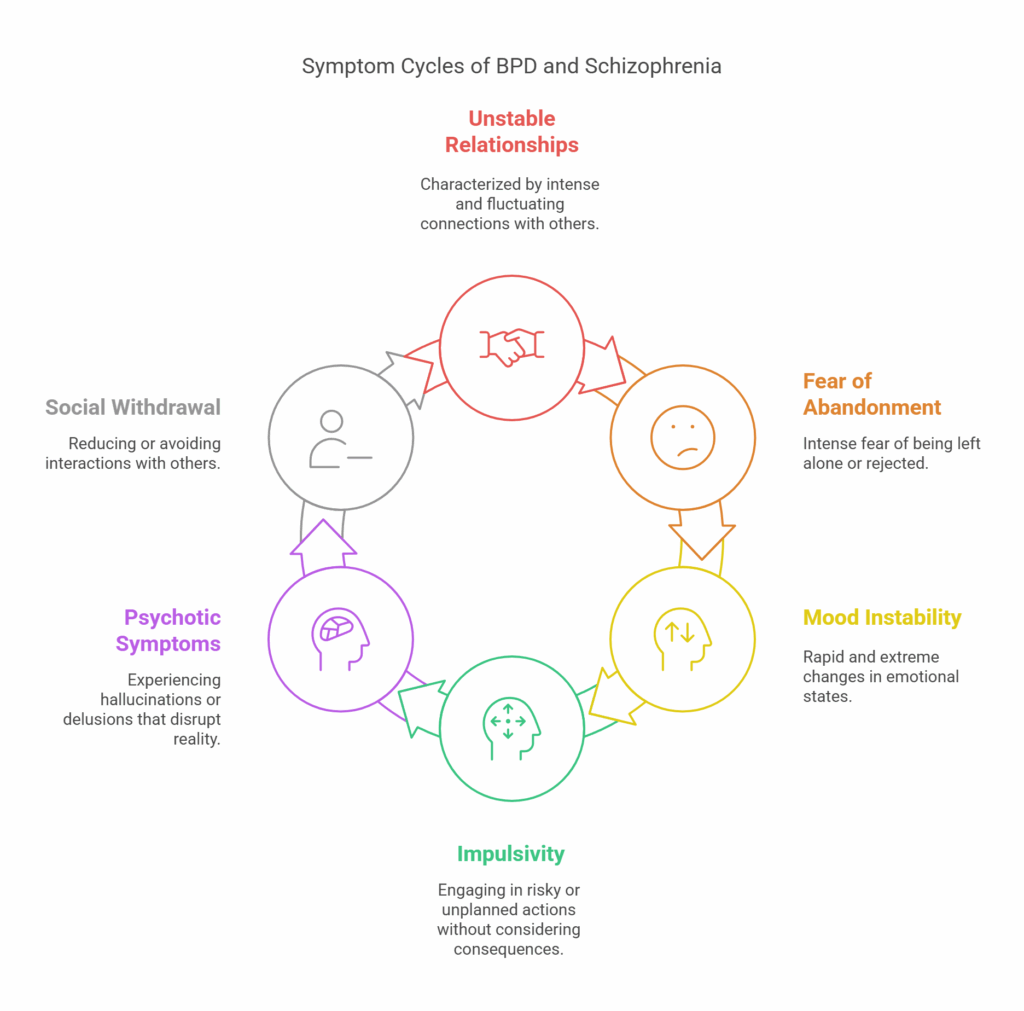Mental health struggles can feel isolating, confusing, and overwhelming. If you or a loved one is battling extreme emotions, irrational thoughts, or behaviors that seem out of control, it’s natural to wonder, what is really happening?
Many people confuse BPD vs. schizophrenia because both conditions affect thoughts, emotions, and behavior. However, they are very different disorders that require the right diagnosis and treatment for healing to begin. Misdiagnosis or lack of proper care can lead to worsening symptoms, substance abuse, and even hospitalization.
At Relevance Recovery, we specialize in treating complex mental health conditions and co-occurring disorders, ensuring each person gets the personalized care they need. Whether it’s borderline personality disorder, schizophrenia, or addiction triggered by these conditions, we provide expert therapy, medication management, and holistic healing to support lasting recovery.

Let’s explore the key differences between BPD vs. schizophrenia, the challenges they bring, and how professional treatment can help you regain control of your life.
Borderline Personality Disorder (BPD) is a mental health condition that deeply affects how a person feels about themselves and others. It often leads to unstable relationships, impulsive behavior, and emotional distress. Many individuals with BPD struggle with substance abuse, depression, or self-harm due to the intensity of their emotions. Borderline Personality Disorder (BPD) has a lifetime prevalence of approximately 3%, which is about four times higher than that of schizophrenia, estimated at around 0.7%.
People with BPD experience rapid and extreme mood swings, making everyday life unpredictable.
BPD can also lead to co-occurring issues like addiction, eating disorders, or depression, making professional intervention essential for long-term stability.
At Relevance Recovery, we use Dialectical Behavior Therapy (DBT), Cognitive Behavioral Therapy (CBT), and trauma-informed care to help individuals with BPD regulate their emotions, rebuild relationships, and break free from destructive patterns.
Schizophrenia is a severe mental illness that affects how a person thinks, feels, and behaves. Unlike BPD, schizophrenia includes psychotic symptoms like hallucinations and delusions, making it difficult for individuals to distinguish what is real and what isn’t.
Many people with schizophrenia also experience co-occurring substance abuse, as they may turn to drugs or alcohol to cope with their symptoms.
Schizophrenia symptoms often appear gradually and become more severe over time.
Schizophrenia is a lifelong condition, but with proper treatment, individuals can lead stable and fulfilling lives.
At Relevance Recovery, we offer comprehensive treatment plans that include medication management, therapy, and life skills training, ensuring individuals can regain their independence and manage their symptoms effectively.
While both disorders involve emotional distress and difficulty functioning, their symptoms are distinct:
The root causes of BPD vs. schizophrenia also vary.
At Relevance Recovery, we understand that mental health disorders often come with addiction or trauma, which is why we take an integrated approach to treatment that heals both the mind and body. In a study, 17% of patients met the criteria for both schizophrenia and BPD, highlighting the potential for symptom overlap and the importance of accurate diagnosis.
Mental health disorders don’t just affect the individual; they impact families, careers, and overall quality of life. That’s why, at Relevance Recovery, we go beyond just symptom management.
We believe that every individual deserves compassionate, effective care, and we are here to guide you every step of the way. Excellent recovery, defined as remission of symptoms and good social and vocational functioning, was achieved in 39% of BPD patients compared to 73% in those with other personality disorders.
Living with BPD vs. schizophrenia can be exhausting, but you are not alone. The right treatment can help you regain stability, improve relationships, and reclaim your future.
At Relevance Recovery, we offer specialized programs designed to support individuals struggling with mental health and addiction challenges. Our team is here to provide the tools, guidance, and care needed for long-term recovery.
If you or a loved one needs professional support, don’t wait. Reach out to Relevance Recovery today and take the first step toward a healthier, more fulfilling life.
FAQs
Yes, schizophrenia can sometimes be mistaken for BPD because both involve emotional dysregulation and difficulties in relationships. However, schizophrenia includes psychotic symptoms like hallucinations and delusions, which are not present in BPD. A proper diagnosis is essential for effective treatment.
Untreated BPD can worsen with age, leading to more severe mood swings, impulsive behaviors, and relationship struggles. Without therapy and support, individuals may develop co-occurring issues like depression, anxiety, or substance abuse, making daily life increasingly difficult to manage.
Schizophrenia is often considered one of the hardest mental illnesses to live with due to its severe impact on perception, thinking, and reality. The condition can lead to social isolation, difficulty maintaining relationships, and challenges in daily functioning without proper treatment.
Schizotypal Personality Disorder (STPD) is the closest personality disorder to schizophrenia. It shares symptoms like paranoia, social withdrawal, and unusual thoughts but lacks full-blown psychotic episodes. While similar, STPD does not typically cause the severe cognitive and perceptual distortions seen in schizophrenia.